UNU-INRA outlines new framework for mineral resources governance
-
October 3, 2018 Accra
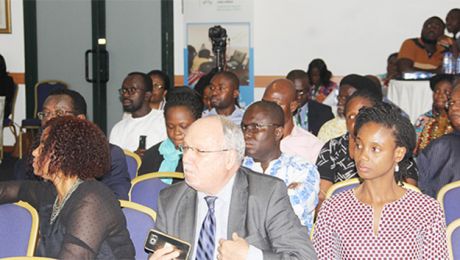
Cross-section of participants at the lecture
Accra, 27 September 2018 – The United Nations University Institute for Natural Resources in Africa (UNU-INRA) has called for the adoption of the new robust mineral resources governance framework, the Sustainable Development Licence to Operate (SDLO), to address mining sector challenges and promote sustainable development. This was the key message of a presentation on the topic “Mineral Resources Governance for Sustainable Development: A New Framework” delivered by Dr Elias T. Ayuk, out-going Director of UNU-INRA, at a farewell lecture held in his honour.
According to Dr Ayuk, mineral resources governance continues to present many challenges, especially for developing countries, with empirical evidence pointing to ‘resource curse’ as a manifestation of poor governance. He noted that the current governance landscape is marked by fragmentation and initiatives fatigue resulting from a complex array of governance frameworks and initiatives, numbering over 75, and underscored “a pressing need to consolidate existing governance instruments. . .”
He highlighted the Sustainable Development Licence to Operate (SDLO) as a new sustainable and development-driven framework for mineral resources governance. “The SDLO constitutes a new multi-level holistic and integrated governance framework applicable to governments, companies and the broader range of stakeholders in the extractive industry,” he stated.
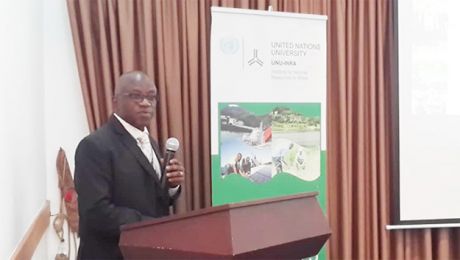
Dr Ayuk delivering his presentation
He explained that this framework is premised on critical building blocks – a holistic approach, decoupling economic growth from environmental and social impacts, respect for human rights and culture, greater engagement of home countries, responsible business practices, balance between security of supply concerns and sustainable development aspirations, data, information and knowledge – which are pre-conditions for a robust governance instrument.
According to Dr Ayuk, the SDLO builds on the ‘social license to operate’ but covers a broader subject matter (including the nexus of all environmental, social and economic concerns that fall within the subject matter ambit of the SDGs) and a wider range of actors across the public, private and third sectors. Among other qualities, the SDLO advocates for a new governance regime with an explicit foundation based on the notion of participation, common concern, joint responsibility, responsible business practice, stewardship and duty of care.
In her remarks, Dr Fatima Denton, newly appointed Director of UNU-INRA, thanked Dr Ayuk for a rich and informative presentation, describing him as a champion of natural resources matters in Africa, who has made huge contributions to put UNU-INRA on the map.
She emphasised the important role of research data in addressing Africa’s natural resource issues and broader development challenges. “We have to start locally and enable our research institutions to cater for our knowledge needs and align these with our development goals,” she said, adding that “we have to use our research institutes as producers of knowledge, not only as contributors to research but as influencers of research outcomes”.
Further, Dr Denton underscored the need for strong partnerships in complementing individual efforts for improved outcomes. “Our task is huge and we cannot afford to be insular. We have to elevate science to economic literacy and anchor our work to respond to problems that our governments, farmers, pastoralists and vulnerable communities are wrestling with,” she stressed.
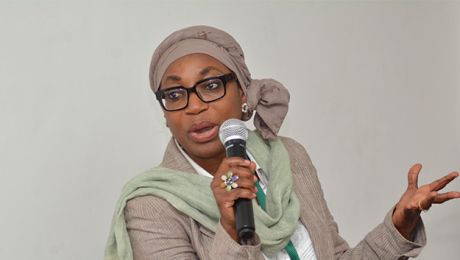
Dr Fatima Denton delivering her remarks
Focusing on UNU-INRA, Dr Denton reiterated her commitment to build on the legacy of Dr Ayuk, notably to extend and leverage existing networks with UN agencies, the University of Ghana, private sector, research institutes and like-minded institutions.
The lecture was attended by key stakeholders including heads of UN agencies in Ghana, representatives from the University of Ghana, members of the diplomatic corps and the media. Participants shared the view that the mining sector has an important role in the transition towards sustainable development. It was, however, noted that achieving sustainable and inclusive mining sector-based development is a global joint responsibility that requires the involvement of key stakeholders, especially universities and research institutes that produce knowledge on natural and mineral resources.
Dr Ayuk’s presentation is based on UNEP International Resource Panel recommendations, and a journal article by Pedro, A., Ayuk, E.T, Bodouroglou, C. et al., published in the Mineral Economics Journal (2017). It is available at: https://link.springer.com/article/10.1007/s13563-017-0108-9
###
Photo Gallery
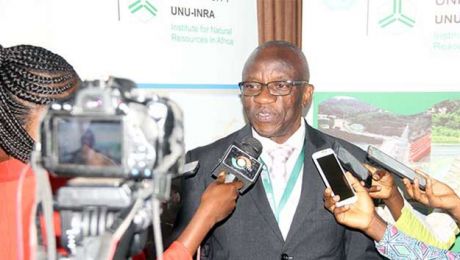
Dr Ayuk addressing the media
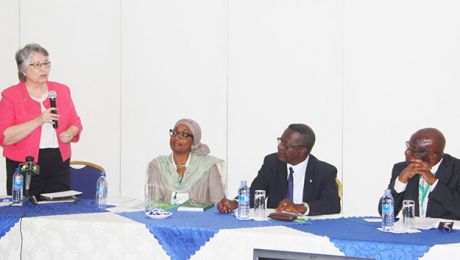
Ms Christine Evans-Klock (UN Ghana Resident Coordinator) making an intervention. With her on the high-table are: [l-r] Dr Fatima Denton (Director, UNU-INRA), Prof Emmanuel Owusu-Bennoah (Former UNU-INRA Advisory Board Member, Event Chair) and Dr Ayuk
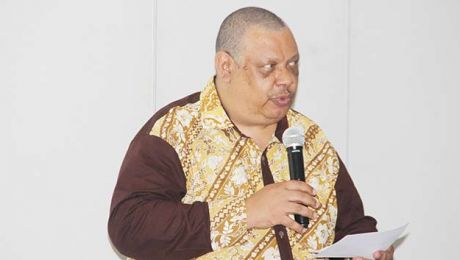
Prof Chris Gordon (University of Ghana) making an intervention
-
high-table-ed.
Media release - UNU-INRA outlines a new framework for mineral resources governance